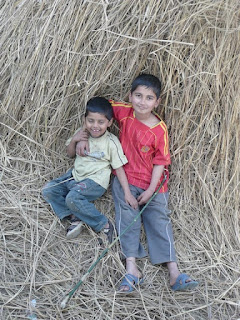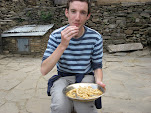Here are some New Year's Resolutions for Nepal and for me - not that I normally make them you must understand, let alone follow them!
Nepal Electric Authority (NEA) - Work out how to power the country betterWe're on to 12 hours a day load shedding now - half a day of scheduled power cuts. You might think that because Nepal is a poor country that electricity isn't that important, people wouldn't need it. And that may be true where there are villages not connected to the grid and everything is geared towards alternative light, heat and so on. However, in many towns and cities now, the houses have been built assuming a constant electric supply. So, the lighting is electric, the water pump is electric, the rice cooker is electric, the heating - if any - is electric.
So, it just doesn't make you go to bed that little bit earlier, but it affects your whole life. Every morning, we have to spend 30 minutes bringing water from our tank under the house to the kitchen and bathroom. This is not only because we don't have any electric to pump the water to the electric tank, but we have no electric to pump the water from the mains line to the main tank under the house. So we are dredging up the bottom of the tank, hoping we have enough water for the next days. And water is a big problem. Not enough water means the house can't be kept as clean as everyone would like, clothes can't be washed regularly as there just isn't the water to use on it, and a bout of stomach problems can cause planning nightmares. For cooking, the rice cooker can no longer be used, meaning that the pressure cooker is used to cook rice, using more gas - additional expense. Also, the evening meal is cooked in torch and candlelight - making it more difficult. Students cannot study at night, because there is no light. And those who have to go to school in the day, or work in their house during the day, can find no time to study.
For the rest of Nepal, there is talk of severe redundancy. Businesses that rely on electricity to run machinery and so on either require their own expensive generators, or have to operate a reduced hours schedule. The only options for businesses are to have diesel generators or, if the electricity requirement is small enough, have a set of batteries to run whilst the line is down. The first option increases diesel use in the country, the oil trade here is still reeling from the middle of last year and on several occasions there is no petrol or diesel available. The second option does nothing to reduce the load on the already overstretched electricity supply, it just increases the load when the electric supply is back on. And if some are anything like our office, sometimes there is not enough capacity in the system to power the equipment for the length of the power cut. We've had a couple of occasions when our office went into blackout.
The Nepal Government has recognised this as a big problem, and has declared an energy emergency. They are looking at investing in diesel generators that will generate around 20% of Nepal's requirement. But this is not a sustainable solution. If the price of oil soars again, what will the government do then? And rumours are that the electricity will cost 30 rupees a unit to produce, when it is sold for just over 7 rupees per unit. Even if the rumours are false, and it costs 10 rupees a unit, the government will find themselves driving the already debt-ridden NEA into more financial crisis. Nepal's big energy hope is hydropower. So, when NEA decided to change their buying tariff off the hydroelectric producers, everyone was hopeful that this would encourage people to build more and bigger plants to cover the surplus. But no. The average buying price is around 4.5 rupees a unit from the day it starts to produce electricity, with a 3% inflation every year after. Many developers have found that their planned new hydro plants are no longer economically viable. So they are going to scrap all these plans. And what's worse, the government are currently buying electricity from India for 6 rupees a unit. So, the big plants are no longer economically viable, and small plants that can be built quickly will be profitable. But small hydro-plants are not the answer - like digging out of jail with a toothpick - it can be done, but will take far too much time.
So, what's the answer. Obviously the diesel generators can only be a temporary measure. Nepal's answer must lie in Hydropower. But how can you encourage developers, who want to make money, without charging a large amount to customer - ultimately affecting the poor? I think if there were less fingers in the hydropower pie, then maybe it would be more profitable - as with many developing countries, corruption is still rife here in Nepal and with large amounts of money comes large amounts of corruption. Also, if the private people who used more electricity paid more, and the government made more measures to encourage energy saving which would reduce load on the overstretched system.
The NEA and their international advisors have a big job on their hands. As for us, we're going to have 16 hours load shedding starting from Saturday. The fun continues...
Nepal Government - Wake up and smell the coffeeA 'New Nepal' was declared after the election, much hope for the world's newest federal republic. But that hope is now waning in its people. The Maoist-led government seems to be stricken with in-fighting and power grabbing, much as many of the previous democratically elected governments were. The new constitution, which was main aim of this government has not been started yet, 8 months on. The parties seems to be tearing up each other from the inside and ripping into each other's policies.
What affect is this having on the people of Nepal? Well, I've just returned from the Terai, in the south of the country. There I was told that the pahadi - hill - people who used to live here after the jungles were cleared by the government in the 1950s are running away from the Terai to the larger towns and cities, such as Kathmandu, Hetauda and Narayangadh. Some Madeshi people - immigrants from India - are causing a huge uprising in these areas. Along with this, other ne'er-do-wells in Nepali socity are seeing the crumbling security situation and jumping on the insurgency bandwagon. In Janakpur, the largest city in the eastern Terai, I was told that there are almost no hill people at all, they are all Madeshi. The hill people have been driven out through intimidation, kidnapping, extortion and murder. And the army and police can or will do nothing. They sit in their camps too scared to confront these groups, their posts regularly looted of weapons and equipment.
And when you talk to people in Kathmandu, most of them are not actually from Kathmandu but have moved here. Some are economic migrants, but a large number had to leave there homes - either from the Maoist rebellion in the late 1990s and beginning of this century or from the recent violence in the Terai. This has led to a population explosion here in the Kathmandu Valley. (Incidentally, this cannot be helping the electricity or water situation.)
And the worst part is, again it's the poor people who are suffering. Only the richer people can move to the larger towns, affording the increased price of land and food, with skills that are needed in cities. The poor people must sit it out, hoping that their house is not next on the target list of these groups, hoping their children are not kidnapped, their sons not forced to join the ‘thug army’.
And what is the Nepal Government doing about this all. Nothing. Fighting amongst themselves. Every day stories of kidnap, murder and extortion, and all the government can do is argue about who should be agreeing with who. All the Nepali people want is a bit of peace and stability. Let’s all hope that the government pull themselves together and give this to their people.
There is quite a good column on this, from a local newspaper. It can be found
here.
Me - Decide where you're goingDecision time looms for me. My money I had saved for this trip is almost at an end, and so I need to work out what's going to happen now. Something I thought would be easy, but it's not. I have different parts of me pulling in polar opposite directions. What will happen? I don't know. Some deep thinking and prayerful thoughts are needed.
Me - Put on weight (this is nothing to worry about!)
I went to buy some jeans from a tailor the other day. When they measured my waist they said 31 inches. Now normally in the UK I'm about 34 or so. So this is a slight problem. I know I've lost a bit of weight whilst being here, but I didn't think it was that much. So, I'm going to try and eat more - something which I find very hard - and eat a bit more often. But, I know when I get back to the UK, my weight will get back up again - and my new tailored jeans won't fit!
Just before New Year I went down to the Terai to visit Didi, my friend's sister, and her husband and youngest child Bipin with Bibek - their eldest son. We caught the bus early in the morning, freezing cold, and then were even colder when we realised that the window level with my head was completely broken. So, I spent 4 or 5 hours sat in a freezing wind with pieces of glass flying at me in at regular intervals. The joys of Nepal. Our bus driver was fairly suicidal, overtaking around blind corners and leaning the bus rather hard into corners. However, this did mean that we arrived in double quick time - just 8 hours from Kathmandu for a journey that normally takes 10 - 12 hours.
At Didi's house I rested. It wasn't as warm as I thought it might be, still 2 t-shirts were the order of the day, and at night it was as cold as Kathmandu. But the one saving grace was that there was a fire stove meaning heat. Completely environmentally unfriendly, but good and warm. And we slept, ate, read, drank their buffalo milk and talked. I had not really a good chance to talk with Didi before, so this was great to get to know her better.
 Me and Bipin - known as Bijuli, electricity, as he buzzes around all over the place
Me and Bipin - known as Bijuli, electricity, as he buzzes around all over the place
 Bibek and Bipin
Bibek and Bipin
And after a few days it was time for me to leave again. Bibek stayed there, and will come back at the end of his winter holidays with Didi and his brother. I caught a jeep from the nearest town which got me back to Kathmandu in 7 hours just, which again was great - although the road it went along was rather bumpy and made me very sore from head to tail.
So, a new year, a new Nepal as well? Let's hope and pray so.
SAM




